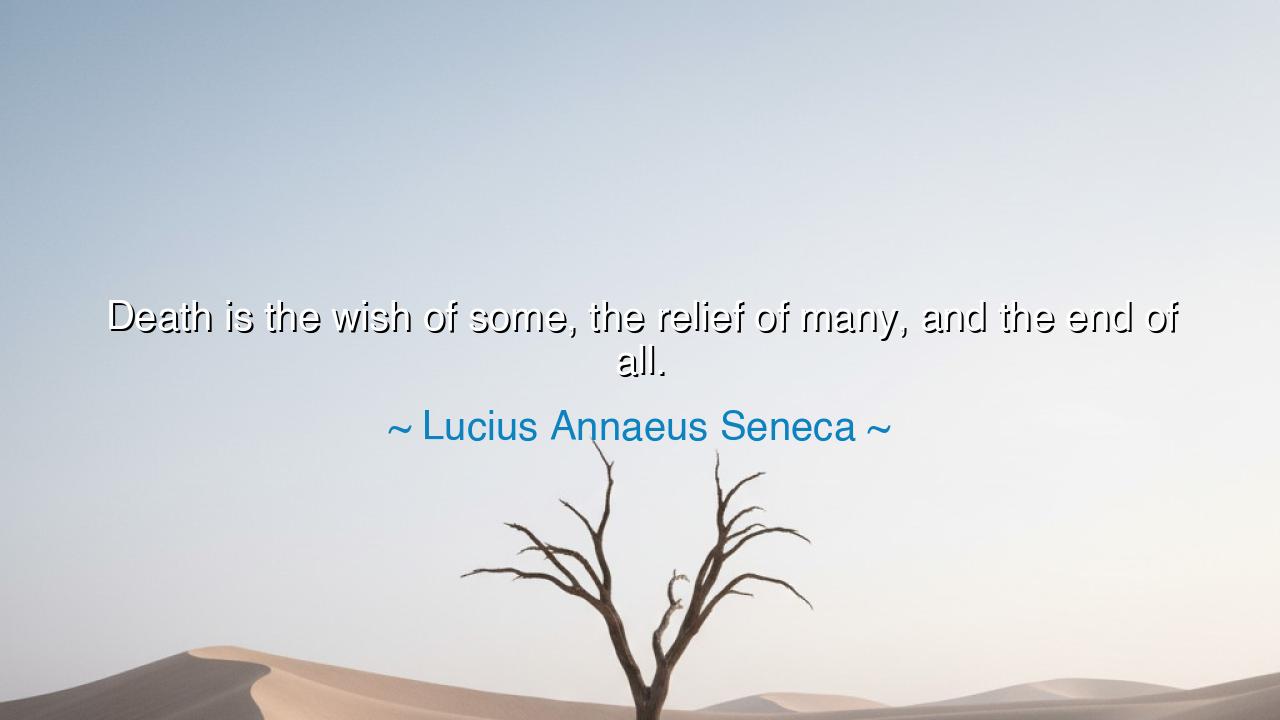
Death is the wish of some, the relief of many, and the end of






“Death is the wish of some, the relief of many, and the end of all.” Thus spoke Lucius Annaeus Seneca, the Stoic philosopher of ancient Rome, whose mind shone with both fire and calm, and whose words were forged in the crucible of suffering and reflection. In this sentence, he distilled the essence of human mortality—the truth that death, though feared by most, is not a singular experience, but a mirror that reflects the inner condition of every soul. To some, it appears as an escape from torment; to others, as a merciful release from weariness; and to all, as the inevitable closing of life’s great cycle.
To the Stoics, death was not a terror to be fled, but a teacher to be heeded. They saw it not as an enemy, but as the natural counterpart of birth, the boundary that gives shape and meaning to existence. Seneca, who lived under the shadow of tyrants and the threat of execution, knew that to meditate upon death was to learn how to live well. For the man who accepts death as part of the order of things is free from the chains of fear. He walks through life with dignity, no longer clinging desperately to fleeting pleasures or trembling before loss. Thus, in his wisdom, Seneca reminded mankind that our relationship with death reveals our relationship with life itself.
When he writes that death is “the wish of some,” he speaks of those who are burdened by anguish too great to bear—souls who see in death not an enemy but a friend. History has known many such figures: Socrates, condemned by Athens, who drank the hemlock calmly, saying that no harm can come to a good man; or Cleopatra, who, faced with the loss of her kingdom and her dignity, chose to embrace death as her final act of sovereignty. To these, death was a wish—a chosen freedom, an assertion that the human spirit remains unconquered even in its last hour. Though their bodies perished, their acts echo still, proving that death cannot silence those who die with purpose.
But “the relief of many”—ah, there lies another truth. To the aged, to the weary, to the ones who have seen their hopes dim and their companions fade into the past, death comes not as a thief, but as a gentle hand upon the shoulder. It is the rest after long labor, the stillness after the storm. Think of Marcus Aurelius, another Roman philosopher-king, who ruled with justice and patience. In his old age, he wrote of life as a soldier returning from battle—scarred but unafraid, ready to lay down his sword. For such as these, death is not darkness, but the quiet dawn of peace. Their hearts, long tested by the burdens of existence, find in death the serenity denied them by the struggles of life.
And then, Seneca concludes, it is “the end of all.” No matter our rank or virtue, our joys or our griefs, the great equalizer awaits us all. The emperor and the beggar share the same fate; the proud and the humble alike are gathered into the silence beyond the grave. Yet Seneca does not write this to inspire despair—he writes it to free us. For if death is certain and impartial, why waste life in fear or vanity? The wise man learns to walk lightly upon the earth, grateful for each sunrise, untroubled by the dusk that must follow. He does not clutch at possessions or titles, knowing they cannot follow him into eternity. Instead, he strives to live with virtue, to leave behind deeds that endure beyond the flesh.
In this, we see the true heart of Seneca’s teaching: to contemplate death is not to court sorrow, but to awaken to the fullness of life. Only when we accept the end can we begin to live rightly—to forgive more easily, to love more deeply, to act more bravely. The one who sees life as fleeting learns to waste none of it. The one who accepts death as inevitable becomes unafraid of its approach. Thus, wisdom is born not from the denial of mortality, but from its understanding.
Take then, from Seneca’s words, this lesson: do not dread the shadow of death, for it is the companion of every heartbeat. Live in such a way that when the end comes—whether as wish, relief, or simply the end of all—you may greet it with calm eyes and an untroubled spirit. Seek not to escape life nor to prolong it beyond meaning, but to fill it with virtue and grace. For when death finally opens its door, may you step through not in fear, but in peace, knowing that you have lived fully, wisely, and well.
Thus, as the Stoics taught, death is not the destroyer of life—it is its completion. The flower that fades has not failed; it has fulfilled its purpose. And so too shall we, when the time comes, lay down our days as a gift returned to the universe, leaving behind not silence, but the echo of a life lived in harmony with the eternal order of things.






AAdministratorAdministrator
Welcome, honored guests. Please leave a comment, we will respond soon